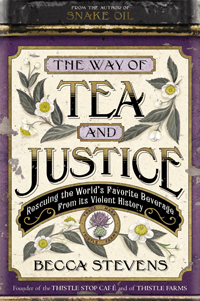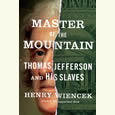Much More than Tea and Sympathy
In The Way of Tea and Justice, Becca Stevens tells the story behind Nashville’s Thistle Stop Café, a cottage industry for former prostitutes
“A Story in Every Cup”—that’s the motto of the Thistle Stop Café in Nashville, Tennessee. In The Way of Tea and Justice, Becca Stevens tells the story of the Thistle Stop Café itself and explains its impetus: the desire to create a place of hospitality, healing, and hopefulness where, in Stevens’s words, “we recognize the dignity of each person.”
 Stevens is an Episcopal priest, an award-winning champion of social justice, and the founder of Magdalene, a residential program for prostitutes escaping abuse and addiction. In 2001, she founded Thistle Farms, a cottage industry for creating body-care products, as a way to employ graduates of Magdalene. The Thistle Stop Café is a natural outgrowth of that work, and her new book is the story of how it came into existence.
Stevens is an Episcopal priest, an award-winning champion of social justice, and the founder of Magdalene, a residential program for prostitutes escaping abuse and addiction. In 2001, she founded Thistle Farms, a cottage industry for creating body-care products, as a way to employ graduates of Magdalene. The Thistle Stop Café is a natural outgrowth of that work, and her new book is the story of how it came into existence.
The Way of Tea and Justice is a redemption narrative, but it is also a primer on tea—its historical, cultural, and economic impacts, both around the corner and across the world. The story of tea stretches back more than 3,000 years, from China to India to Europe and South America, carried initially by monks on pilgrimage and later by Portuguese and Dutch trading ships. The lust for tea led to new forms of trade and larceny, exploration and enslavement—the building of great fortunes and the tremendous loss of life.
Stevens touches on tea’s historical influence through tales of such notables as Princess Catherine of Portugal, whose dowry to King Charles II of England included both a quantity of tea and the city of Bombay (now Mumbai) and led to the formation of the powerful East India Trading Company. Tea also figured prominently in Ernest Shackleton’s expedition to Antarctica, Britain’s role in World War II, and Mohandas Gandhi’s fight for Indian independence, not to mention that infamous Tea Party held in Boston in 1773. According to Stevens, “Tea provides a window through which we can view a global history.”
 But she is most interested in the spiritual influence of tea and sees it as a metaphor for her own very personal journey of self-discovery as she coped with both setbacks and triumphs in the long process of creating a business designed to help women rebuild their lives from the ground up. Along the way, she celebrates the diversity of tea—drinking Earl Grey at the Eagle and Child in Oxford, England (a pub that was the famous haunt of C.S. Lewis and J.R.R. Tolkien) and sweet iced tea in Pigeon Forge, Tennessee. She explains how the history and culture of tea bind people together through ritual—nourishment both physical and spiritual—and through burdens shared across time.
But she is most interested in the spiritual influence of tea and sees it as a metaphor for her own very personal journey of self-discovery as she coped with both setbacks and triumphs in the long process of creating a business designed to help women rebuild their lives from the ground up. Along the way, she celebrates the diversity of tea—drinking Earl Grey at the Eagle and Child in Oxford, England (a pub that was the famous haunt of C.S. Lewis and J.R.R. Tolkien) and sweet iced tea in Pigeon Forge, Tennessee. She explains how the history and culture of tea bind people together through ritual—nourishment both physical and spiritual—and through burdens shared across time.
Stevens takes comfort in the fact that all varieties of tea can be traced back to a common ancestor in the Hunan region of China. “Tea becomes a beautiful symbol of the theological truth that we are all connected,” she writes. “Like love, it all comes from the same source but can be expressed a thousand ways.”
The Way of Tea and Justice includes a variety of tea recipes, such as Milk Thistle Tea, French Press Iced Sweet Tea, and Throat-Coat Tea, plus testimonials from Thistle Farms volunteers and Magdalene community members. And these women, in the end, are the whole point of the Thistle Stop Café: “The women who will serve this tea will have spent, on average, ten years on the street prostituting themselves to support addictions and have lengthy records of arrest or incarceration.” The café is intended to be “a beautiful sanctuary that serves up justice with every cup. The community that helped harm the women,” she writes, “can damn well heal the women, too.”
The story of the Thistle Stop Café is also Stevens’s own story. Following the sudden death of her sister during the time she was building Thistle Stop Café, Stevens writes of her grief, “You are adrift on an ocean of pain. The hope is to cling to other survivors, keep an eye on the distant shore, and try to trust you will find your way back to solid ground.” This is the solid ground that she hopes to provide for others, as she realizes that “tea and Thistle Farms are bonded by their common history of survival, longevity, grace, and healing,” and it is precisely these qualities that she seeks to impart to the staff and patrons of the Thistle Stop Café.
As Stevens concludes her journey of suffering and grief, humility and fortitude, peace and surrender, she finally arrives at the grand opening of the Café and the fulfillment of her dream. Her advice for anyone seeking the difficult yet rewarding path of ministry: “Just do the work of loving the world for days and days and years and years and feel how you are being pulled by a tide of thanksgiving into an ocean of gratitude that is bigger than anything you have ever known.”
A graduate of Auburn University, Tina LoTufo has worked as a technical editor at an engineering firm and as an editorial assistant at Peachtree Publishers, where she worked on books by Erskine Caldwell, Will Campbell, and Ferrol Sams, to name a few. She lives in Chattanooga.


